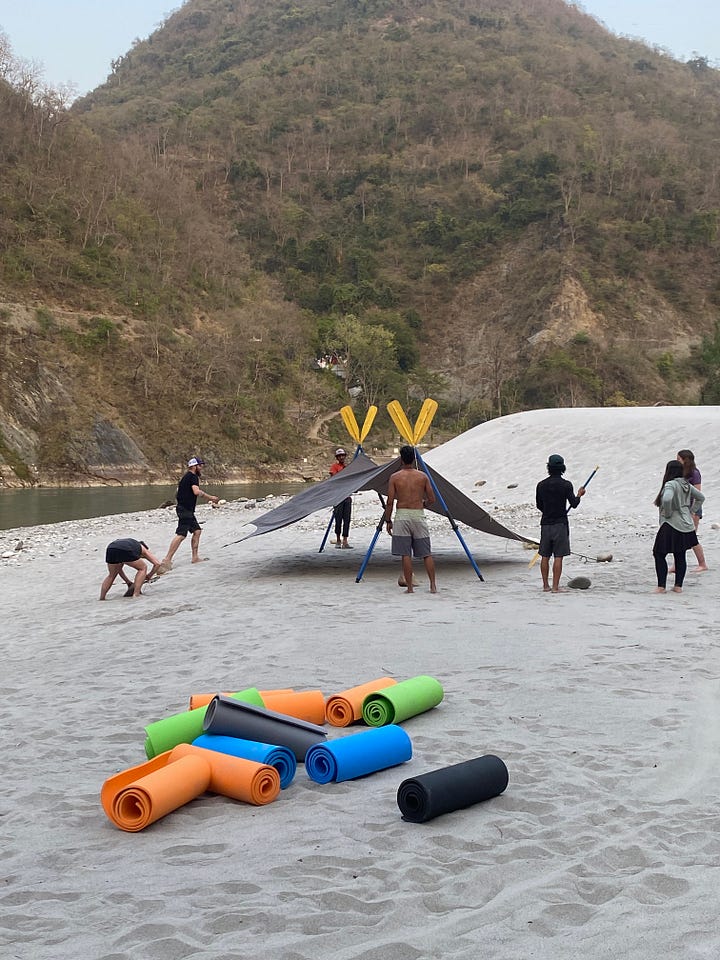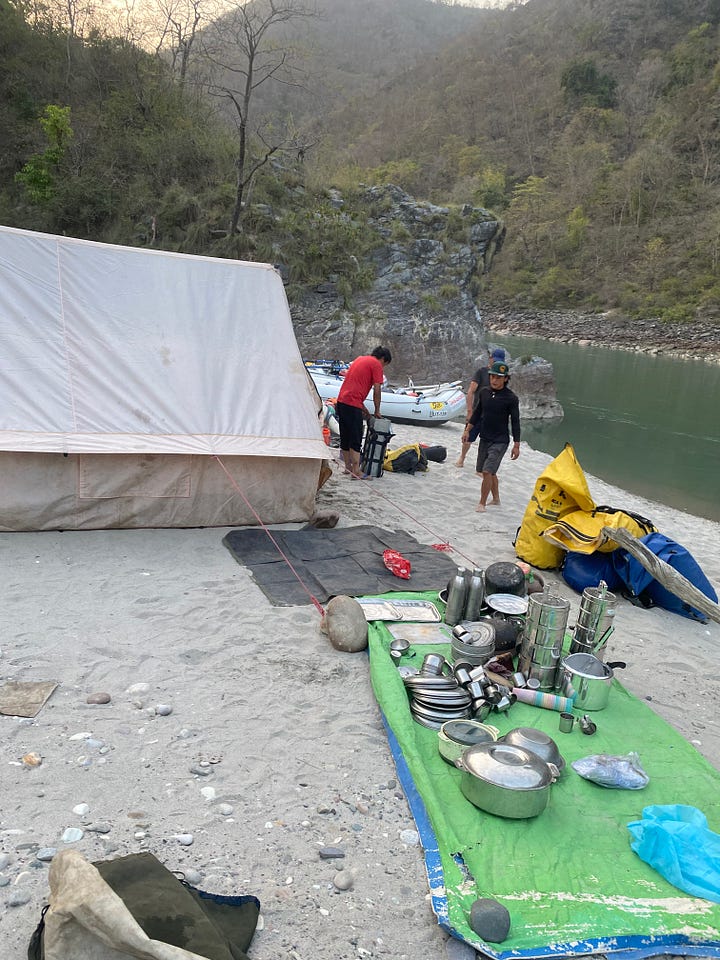rafting: 70km total, but at this point, who’s counting
As cold as it was in Chopta, it was equally as hot in Dev Prayag. Dev, meaning deity, and Prayag, meaning confluence, is where myth and mysticism meet at this Godly Confluence. It is here where the rivers Bhagirathi and Alaknanda merge to become the one and holy, Ganga. It is seen as not just the intersection of rivers, but of nature and the soul. The Ganges, or Ganga as it is known by her people, is the source of life, India’s spiritual lifeline.
Switching out hiking gear into what the river requires, loading it all into dry bags, we descend down the steep banks and into awaiting rafts. Four boats, plus a barge-type raft carrying our movable kitchen. Suraj sits atop pyramids of dry bags and uses long oars to navigate the river, entrusted with our physical lifeline. We will be camping along the river, so we set up and tear down camp each evening and morning. Two to a tent, but we are down one. My partner and tent-mate leaves the mountain and heads straight to the Ayurvedic Resort, which beckons as a reward and a place of recovery at the end of the journey, so I will sleep alone. Even though it means pitching my tent and packing it up alone, I don’t complain. I finally have a sleeping arrangement to myself. We push off, and the water receives us. Revives us. We let it carry us away on its turquoise back deep into more of India’s wildness and wilderness.
I fall into the flow following the lead of the water. I don’t track time or day or location, just the rhythm of the rowing. We stop when it feels like the shadows are getting longer and the air a little (only the tiniest bit) cooler. Finding a sandy shore, we pull the rafts up and begin making camp. I, and a few others, walk the beach looking for driftwood for the fire. We weren’t the only ones recently walking these shores. Paw prints the size of my hands were impressed among the rocks and sand. Pugmarks sunk deeply into the soft beach.
Our orange tents line up just outside of the tree line, where the beach turns to jungle, the “outhouse” a few paces behind and off to the side. Chai appears as the sun disappears, signaling it is almost time to eat. The kitchen tent is remarkable, and the food that comes out of it feels impossibly delicious. Maybe it’s the surroundings and the atmosphere that makes it taste so good, and while that certainly doesn’t hurt, it continues to be some of the most delicious things I’ve ever eaten. I can’t describe it because Indian cooking is done slowly, layered. Allowing for complexities and depth to emerge from simple ingredients like potatoes and peas, but when simmered in garam masala, tumeric, curry leaves, and topped with chutneys as bright green and bright tasting as though the mint and cilantro and lime had just been plucked from their stems, every bite becomes interesting, alive, bouncing around your senses, naming a flavor is elusive and compulsive. After dinner, comes popcorn. Let me romanticize this popcorn… With the beach campfire built and rolling, popped corn coated in curry powder and something smokey and spicy appears. One might think from the taste alone, that they’d died and heaven was made of rivers, sand, beachfires, and popcorn.




With the glow of the flames flickering on faces, under the raining light of stars, we sit on yoga mats and share stories of books read, movies watched, loves lost and found. At one point, something scurries across the sand and launches itself into the fire. We laugh about the kamikaze creature, but as it burns up, we see the char of something that might resemble the shape of a scorpion, and I’m thankful for its sacrifice rather than its sting.
As night descends around us, we pull our mats away from the fires and assemble for an evening yin. We’re in happy baby, rocking and swaying, preparing to sleep, looking at the sky between our feet, when a sound surrounds us. A whoosing, breathy, grating sound. Indistinguishable in its source or its location. Someone says, “It’s probably the water filter pump. They’re probably filtering for the morning.” Before turning in, Kiran pulls the mama aside and tells her to keep her son close. Another guide tells us to move our tents a little closer to the water, away from the trees, and if you need to use the restroom in the night, stay close to your tent and dig a hole; don’t use the outhouse.
In the morning after breakfast, breaking down camp, reloading into the rafts, there is murmuring among the group. “What was that sound last night?” “Oh, it was probably a monkey,” our native guides would answer. Then, “I think it was a wild boar that live in the jungle.” Every answer like the brush-off of a parent to a toddler when they ask a question the parent doesn’t want to answer. But each one is either a little larger big-fish story, OR a little closer to the truth. Until we’re back on our rafts and coursing down the river do they give us a straight answer…
TIGER.
It was the chuffing of a tiger. Tiger chuffing is the equivalent of your pet domesticated kitty purring, but thank goodness we encountered nothing more than the gentle purring of our tiger, who allowed us to sleep by her jungle. And with a good sigh of relief, we have an inside joke complete with hand gestures and a great story to live to tell.





